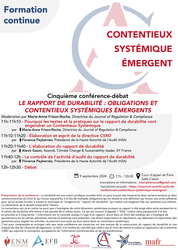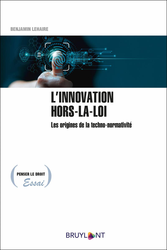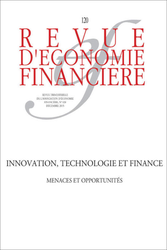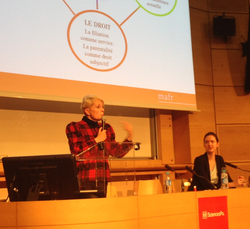
Sept. 9, 2024
Organization of scientific events

► Full Reference: M.-A. Frison-Roche, Scientific direction of the conference Le rapport de durabilité : obligation et Contentieux Systémiques Émergents (The Sustainability Report: Emerging Systemic Obligations and Litigation), in cycle of conference-debates "Contentieux Systémique Émergent" ("Emerging Systemic Litigation"), organised on the initiative of the Cour d'appel de Paris (Paris Cour of Appeal), with the Cour de cassation (French Court of cassation), the Cour d'appel de Versailles (Versailles Court of Appeal), the École nationale de la magistrature - ENM (French National School for the Judiciary) and the École de formation des barreaux du ressort de la Cour d'appel de Paris - EFB (Paris Bar School) and MAFR, September 19, 2024, 11h-12h30, Cour d'appel de Paris, Cassin courtroom
____
► Presentation of the conférence: Sustainability is a new legal concept, the lineaments of which can be found in certain sectors and branches of Law, and which today has both multiple resulting obligations and a definition that is sufficiently unified to allow it to be grasped through the technique and the requirement of the "Sustainability Report", which translates a requirement linked to the systems themselves. The dual materiality mechanism illustrates this.
The Litigation that will ensue shall be imbued with this systemic dimension, since this report was required from this perspective, and the notion of Sustainability itself was conceived in the same way. What is commonly referred to as "ESG" reflects this perspective, which is both structural and long-term: Information is central here, since it is a Report, anchored in the new conception of Corporate Law that is imbued with Governance, where internal and external stakeholders are present. The various Supervisors and Regulators, who go beyond supervising professionals to regulate activities, are also bound to have a role to play in this Emerging Systemic Litigation.
In order to understand and anticipate this, this conference is built around an analysis of the construction of the Sustainability Report and an analysis of the role of the Regulatory and Supervisory Authority, the French Audit Authority, the Haute Autorité de l'Audit - H2A. These analyses are carried out with a view to the Systemic Litigation that will arise from these new requirements and practices, in correlation with Litigation linked to other fields of Systemic Litigation such as Vigilance field.
____
🧮Programme of this event:
Fith conference-debate
LE RAPPORT DE DURABILITÉ : OBLIGATIONS ET CONTENTIEUX SYSTÉMIQUES ÉMERGENTS
(THE SUSTAINABILITY REPORT: EMERGING SYSTEMIC OBLIGATIONS AND LITIGATION)
Paris Court of Appeal, Cassin courtroom
🕰️11am.-11.10am. 🎤Pourquoi les textes et la pratiques sur le rapport de durabilité vont engendrer un Contentieux Systémique (Why the texts and practices on sustainability reporting will give rise to Systemic Litigation), by 🕴️Marie-Anne Frison-Roche, Professor of Regulatory Law and Compliance Law, Director of the Journal of Regulation & Compliance (JoRC)
➡️read the presentation of this speech
🕰️11.10am.-11.20am. 🎤Élaboration et esprit de la directive CSRD (Elaboration and spirit of the CSRD), by 🕴️Florence Peybernès, President of the Haute Autorité de l'Audit - H2A (French High Audit Authority)
🕰️11.20am.-11.40am. 🎤Comment construire un rapport de durabilité ? (How to build a sustainability report?), by 🕴️Alexis Gazzo, Partner, Climate Change & Sustainability leader, EY France
🕰️11.40am.-12pm. 🎤Le contrôle de l'activité d'audit du rapport de durabilité (The control of the audit of the sustainability report), by 🕴️Florence Peybernès, President of the Haute Autorité de l'Audit - H2A (French High Audit Authority)
🕰️12pm.-12.30pm. Debate
____
🔴Registrations and information requests can be sent to: inscriptionscse@gmail.com
🔴For the attorneys, registrations have to be sent to the following address: https://evenium.events/cycle-de-conferences-contentieux-systemique-emergent/
⚠️The conference-debates are held in person only, in the Cour d’appel de Paris (Paris Court of Appeal).
________
Nov. 9, 2022
Thesaurus : Doctrine

► Référence complète : B. Lehaire, L'innovation hors-la-loi. Les origines de la techno-normativité, Bruylant, coll. "Penser le droit", 2022, 275 p.
____
____
📗lire le sommaire de l'ouvrage
____
📗lire la table des matières de l'ouvrage
____
► Résumé de l'ouvrage (fait par l'éditeur) : "Le droit est-il incapable d’encadrer l’innovation technologique ? L’idée est véhiculée ici et là comme un constat désarmant toute tentative de légiférer sur le "nouveau", en raison principalement du rythme incessant de l’innovation.
L’innovation est devenue un phénomène total entrainant des conséquences sociales réelles.
La principale est sans doute l’injonction faite à tous de l’accueillir, quand il ne s’agit pas de l’encourager. Tous les champs de la société sont concernés, y compris le champ juridique.
En droit, l’injonction normative tend à faire émerger ce qu’il convient désormais d’appeler une techno-normativité, entendue comme la potentielle normativité juridique de la technique.
Ce livre, unique sur le marché, propose une réflexion sur le rôle du droit dans notre société, à la fois comme vecteur de techno-normativité mais aussi comme solution ou limitation des effets négatifs de la technologie sur la société.
En partant des écrits les plus récents sur la philosophie, la sociologie et le monde numérique, l’ouvrage propose une lecture critique du rapport entre droit et innovation qui intéressera tant un public universitaire qu’un public de professionnels du numérique.".
________
Sept. 2, 2020
Newsletter MAFR - Law, Compliance, Regulation

Full reference: Frison-Roche, M.-A., For regulating or supervising, technical competence is required: example of the French creation of the "Pôle d'expertise de la régulation numérique", Newsletter MAFR - Law, Regulation, Compliance, 2nd of September 2020
Lire par abonnement gratuit d'autres news de la Newsletter MAFR - Law, Regulation, Compliance
Summary of the news
Through a decree of 31st of August 2020, the government created a national service, the "Pôle d'expertise de la régulation numérique" (digital regulation expertise pole). It has to furnish to State services a technical expertise in computer science, data science and algorithm processes in order to assist them in their role of control, investigation and study. The aim is to favor information sharing between researchers and State services in charge of regulating digital space.
As its acronym indicates, this pole of expertise aims to represents constance in a changing world. Moreover, more than being a national service, this organism must adopt a transversal dimension, its creation decree being signed by the Prime Minister, Minister of Economy, Minister of Culture and Minister of Digital Transition. The creation of such a pole shows the awareness of the government of the importance of technical competency in the regulation of digital space and of the necessity to centralize these expertises in one organ.
However, as the decree indicates, this pole of expertise could be consulted only by "State services", that excludes regulators which are independent from the State and which could put the pole in conflict of interest, and courts even if they are supposed to play a central role in the regulation of digital space and even if they are allowed to ask the advice of the regulator about some cases. But if regulators cannot size the pole, to whom does it benefit except the legislator and a few officials?
It would therefore have been better for this pole of expertise to be placed under the direction of regulatory and supervisory bodies, which would have enabled it to be able to be consulted both by regulators and by judges, both of whom are key players in digital regulation.
Aug. 31, 2020
Newsletter MAFR - Law, Compliance, Regulation

Full reference: Frison-Roche, M.-A., Compliance by Design, a new weapon? Opinion of Facebook about Apple new technical dispositions on Personal Data protection, Newsletter MAFR - Law, Compliance, Regulation, 31st of August 2020
Read by freely subscribing other news of the Newsletter MAFR - Law, Compliance, Regulation
Summary of the news:
Personal Data, as they are information, are Compliance Tools. They represent a precious resource for firms which must implement a vigilance plan in order to prevent corruption, money laundering or terrorism financing, for examples. It is the reason why personal data are the angular stone of "Compliance by design" systems. However, the use of these data cannot clear the firm of its simultaneous obligation to protect these same personal data, that is also a "monumental goal" of Compliance Law.
In order to be able to exploit these data in an objective of Compliance and protecting them in the same time, the digital firm Apple adopted for example new dispositions in order to the exploitation of the Identifier For Advertisers (IDFA) integrated in the iPad and in the iPhone and broadly used by targeted advertising firms, is conditioned to the consumer's consent.
Facebook reacted to this new disposition explaining that such measures will restrict the access to data for advertisers who will suffer from that. Facebook suspects Apple to block the access to advertisers in order to develop its own advertising tool. Facebook guaranteed to advertisers who work with it that it will not take similar measures and that it will always favor consultation before decision making in order to concile sometimes divergent interests.
We can sleep and already make some remarks:
- GDPR imposing to companies that they guarantee a minimal level of protection for personal data does not apply in the United-States. It is then possible that Apple acted through Corporate Social Responsibility (CSR), more than through legal obligation.
- The mode of regulation used here is the "conversational regulation" theorized by Julia Black. Indeed, regulators let the forces in presence discuss.
- This "conversational regulation" does not seem to be very efficient in this case and an intervention of administrative authorities or of judges could be justified via Competition Law, Regulation Law or Compliance Law, knowing that Competition Law will favor access right to information and Regulation or Compliance Law private life right.
The whole paradox of Compliance Law rests in the equilibrium between circulation of information and secret.
Dec. 16, 2015
Thesaurus : Doctrine

Référence générale : Verdier, M., Innovation, concurrence et réglementation pour la fourniture de services bancaires en ligne, in Revue d’Économie Financière, Innovation, technologie et finance. Menaces et opportunités, n°120, déc. 2015, p. 67-89.
Les étudiants de Sciences po peuvent lire l'article via le drive dans le dossier "MAFR - Régulation".
Il est remarquable que dans cet article le droit de la concurrence soit perçu et analysé que comme une "réglementation".
Dans cette perspective, il est posé que cette "réglementation" doit s'adapter car pour le développement de l'activité bancaire dans l'espace numérique les acteurs doivent coopérer, ce qui est contraire à la base de la "réglementation concurrentielle".
Pour que les opérateurs innovent, il faut donc mettre le cursus entre la concurrence et la coopération, à la fois dans les relations verticales et entre opérateurs installés et nouveaux entrants.
Dec. 3, 2014
Conferences

Cette intervention est la "vision d'anticipation" dans la session relative à L'intermédiaire entre la femme et les porteurs de projet d'enfant, dans le colloque La Maternité face au Marché, tenu à Sciences Po, le 3 décembre 2014.
Voir le programme du colloque.
Voir le diaporama de la présentation.
Voir la vidéo de la conférence.
Lire le working paper ayant servi de base à l'intervention.
Si on "imagine" le futur de la gestation pour autrui, l'on voit le développement des technologies et des entreprises, avec l'enrichissement de celles-ci grâce aux premières. Si l'on tire le trait, c'est un tableau très sombre qui se développe, dans lequel l'humain devient un produit de marché, pour le client solvable, tandis que l'humanité insolvable serait sortie du cadre.
Qu'on me dise que cela s'arrivera pas, qu'on me dise que je me trompe. Qu'on me dise que la logique dont tous les éléments sont déjà en train de fonctionner ne va pas se déployer. Dans le temps "classique", l'ordre du droit, l'ordre de la nature, l'ordre des moeurs et l'ordre du marché étaient articulés. Par des mouvements profonds, ces ordres deviennent des sous-jacents de marché, tandis que le droit lui prête son imperium ayant renoncé à sa juris-dictio. Dans ce monde empli de juristes et de contrats mais sans principes de droit, l'Humain nouveau est le premier bien de consommation de l'humain. Cela tient au fait qu'aurait disparu la Parole politique, le logos. Cela est la première puissance. Nous verrons à l'avenir si elle reste taisante ou si le Politique parle, c'est-à-dire dit ce qui doit être, parce que l'Humain ne doit pas l'objet prenant toutes les formes imprimées par les désirs dont il est l'objet. Nous verrons.
Updated: July 31, 2013 (Initial publication: Nov. 8, 2011)
Teachings : Les Grandes Questions du Droit, semestre d'automne 2011

Updated: July 31, 2013 (Initial publication: Oct. 25, 2011)
Teachings : Les Grandes Questions du Droit, semestre d'automne 2011
